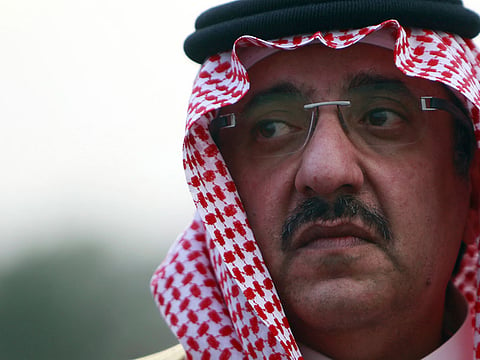New Saudi Deputy Crown Prince marks generational shift
Prince Mohammad may become country’s first king from the third generation of its ruling dynasty

Riyadh: Saudi Arabia’s Interior Minister, Prince Mohammad Bin Nayef, a close friend of the United States and a scourge of Islamist militants, will be the country’s first king from the third generation of its ruling dynasty.
King Salman moved swiftly to appoint Prince Mohammad Bin Nayef as Deputy Crown Prince on Friday, hours after he took the throne following the death of King Abdullah. The decision appeared to settle for many years to come tough decisions over the kingdom’s future succession.
By sending an assassin to try to kill Prince Mohammad when he was Saudi security chief in 2009, Al Qaida paid him the compliment of treating him as one of its most dangerous enemies.
The prince narrowly survived that attack, in which a militant approached him claiming he wanted to defect before detonating a bomb concealed under his clothes, and was named Interior Minister in November 2012.
The 55-year-old is now firmly established as the most powerful member of his generation in the ruling family, and even before he becomes king will be one of the most important figures in the world’s top oil exporter.
He is the first grandson of Saudi Arabia’s first monarch, King Abdul Aziz to join the line of succession.
He remains in his position as Interior Minister, Friday’s decree said.
A March 2009, US embassy cable released by WikiLeaks described Prince Mohammad as already being the de facto interior minister and said he was “held in high regard by Saudi King Abdullah ... and well respected by the Saudi populace”.
Yet despite his constant contacts with Western -- particularly American -- officials and a prominent media presence through his security role, Prince Mohammad remains something of an unknown quantity.
Diplomats and Saudi analysts and academics are uncertain what positions he holds on the big long-term issue facing the kingdom: reconciling social change and a young population with conservative traditions and an oil-dependent economy.
“I would assume he’s from the second generation of princes who are more receptive to ideas of reform. But he is good at making everybody think he is in their camp. That’s what makes a successful politician,” said Jamal Khashoggi, general manager of Al Arab News, when Prince Mohammad was appointed in 2012.
Prince Mohammad is now the youngest member of the select group of princes at the top of government who control the most important portfolios such as foreign affairs, intelligence and defence.
The prince, a son of the late Crown Prince Nayef who had served as Interior Minister since 1975 until his sudden death from a heart attack in 2012, has come to be closely identified with the formidable structure his father created.
But unlike the late Nayef, who was widely regarded as an instinctively conservative man who took policy cues from the country’s powerful clergy, Prince Mohammad was educated in the United States, receiving a degree in political science in 1981.
An old friend of the interior minister described him as being a fan of Hollywood action films and a gun enthusiast, who built a private shooting range at his palace.
In a ruling family where big policies are developed through consensus, Prince Mohammad’s views may shape foreign policy too.
His focus on the risk of creating a new wave of domestic militants helped shape a Saudi policy on Syria that included more government aid to the opposition while discouraging private citizens from becoming donors or rebels.
Prince Mohammad, who remains as Interior Minister, according to the royal decree carried on state television, is next in line to rule after Salman and Crown Prince Muqrin.
King Salman also appointed his son Mohammad Bin Salman as defence minister and head of the royal court, state television said.
The king decided to keep other ministers, including in the foreign, oil and finance portfolios, in their positions, television reported citing a royal decree. Khaled Al Tuwaijri, head of the royal court under the late King Abdullah who died earlier on Friday, was relieved of his post, state television said.


